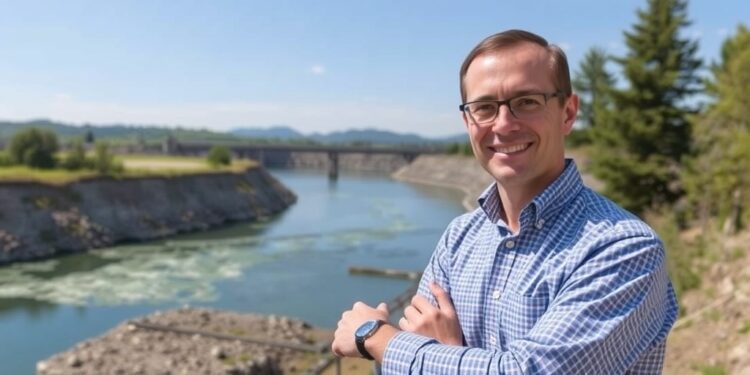Worcester, Mass.—March 25, 2025—In a groundbreaking initiative aimed at addressing the dual challenges of environmental sustainability and the burgeoning demand for nuclear energy, a chemical engineering professor at Worcester Polytechnic Institute has been awarded a substantial $800,000 grant by the U.S. Department of Energy (DOE). This funding will enable in-depth research into the recovery of critical minerals, particularly uranium, from industrial wastewater. The impetus behind this research is the accelerating demand for nuclear fuel, spurred by a global shift towards cleaner energy sources as countries increasingly recognize the value of nuclear power in achieving energy independence and combating climate change.
To frame this discussion, one must first consider the context of nuclear power’s future. According to the International Atomic Energy Agency, in their "high case scenario," global nuclear power capacity is projected to amplify by an astonishing 2.5 times the current levels by the year 2050. The rise in nuclear energy stems from its potential to provide a large-scale, low-carbon energy source. However, this expansion demands innovative approaches to uranium sourcing—especially if the mining and milling processes often generate highly toxic wastewater.
Most traditional uranium extraction methods have proven inadequate for addressing environmental concerns and growing energy needs. Current processes primarily rely on adsorption techniques which not only incur high costs but also exhibit limited efficiency in capacity. This is where the research led by Xiaowei Teng, the James H. Manning Professor of Chemical Engineering at WPI, comes into play. Teng’s research aims to delve into the electrochemical behavior of heavy metal ions when interacting with electrode materials. By better understanding these interactions, the ultimate goal is to design an advanced electrochemical system capable of efficiently extracting uranium from contaminated wastewater.
The transition towards more efficient and less harmful methods of uranium extraction cannot be understated. Teng emphasizes the vital necessity of moving away from trial-and-error strategies. Instead, the research will concentrate on discerning the core attributes that enhance uranium recovery. A crucial aspect of the study will involve the innovative development of new electrode materials designed for durability and repeated use, while maintaining a focus on the environmentally responsible recovery of uranium and other critical elements.
Teng’s prior research initiatives, including projects on developing green batteries utilizing chloride ions from seawater and effective urea separation from wastewater, provide a strong foundation for this promising study. By leveraging insights from these pioneering efforts, Teng is positioned to tackle one of the nuclear sector’s pressing challenges: how to recover uranium from wastewater without exacerbating its environmental impact. The expectation is that the methodologies explored in this project could not only lead to increased uranium recovery but also yield significantly less toxic residual wastewater compared to existing techniques.
This innovative research is not just about recovering a vital energy source; it also presents an opportunity to improve ecological health. By extracting uranium from industrial wastewater, we can reduce its prevalence in the environment, thereby enhancing the health of local ecosystems. This multifaceted approach—focusing on resource recovery, environmental stewardship, and energy security—could serve as a model for future research and development, sparking a deeper interest in sustainable energy solutions.
Over the three-year duration of this grant, funded by the DOE’s Office of Basic Energy Sciences under the Separation Program, Teng will collaborate with Özgür Çapraz, an associate professor at the University of Maryland, Baltimore County, who will serve as the subaward principal investigator. This partnership is indicative of the collaborative spirit that often fuels innovative scientific breakthroughs, allowing for the pooling of expertise from diverse research domains.
One can appreciate how the nexus of research in wastewater management and critical mineral recovery aligns perfectly with contemporary energy needs. As countries continue to grapple with the implications of climate change and sustainable development, initiatives such as Teng’s can provide not just scientific advancements, but also holistic solutions to some of the most pressing global challenges.
Given the complexities associated with resource extraction and environmental protection, this research will also place significant emphasis on cost-effectiveness. Polluted industrial wastewater represents a substantial untapped reservoir of valuable minerals; thus, developing an efficient electrochemical extraction process could revolutionize how we source uranium. This might not only alleviate resource scarcity but also pave the way for cleaner, more sustainable industrial practices.
Furthermore, the development of cutting-edge materials for electrodes and separation methods holds promise that extends beyond uranium recovery. Innovations in these areas might also catalyze breakthroughs in various fields, including environmental engineering and electrochemical energy management, providing a broader societal impact by enhancing our ability to tackle complex scientific and engineering challenges.
As the world gears up for a future with increased reliance on nuclear power, the implications of this ongoing research are profoundly significant. With a projected increase in nuclear capacity, finding sustainable and environmentally friendly methods for uranium recovery will be essential. This intersection of energy policy, technological innovation, and ecological responsibility highlights the critical role that research institutions like WPI play in shaping our path forward.
In conclusion, this $800,000 grant from the DOE marks a pivotal moment in advancing our understanding of uranium recovery from wastewater and showcases the vital link between academic research and global sustainability efforts. The outcomes of Professor Teng’s study could foster a paradigm shift in the nuclear power industry, offering new solutions that balance energy needs with environmental integrity.
Subject of Research: Recovery of uranium and critical minerals from industrial wastewater
Article Title: Advancing Nuclear Energy: Innovations in Uranium Recovery from Wastewater
News Publication Date: March 25, 2025
Web References: IAEA Nuclear Power Outlook
References: Previous Research on Chloride Ions
Urea Separation Research
Image Credits: Not provided.
Keywords: Uranium, Wastewater, Nuclear Power, Environmental Engineering, Electrochemistry, Resource Recovery, Industrial Pollution, Sustainability, Green Technology, Chemical Engineering.




